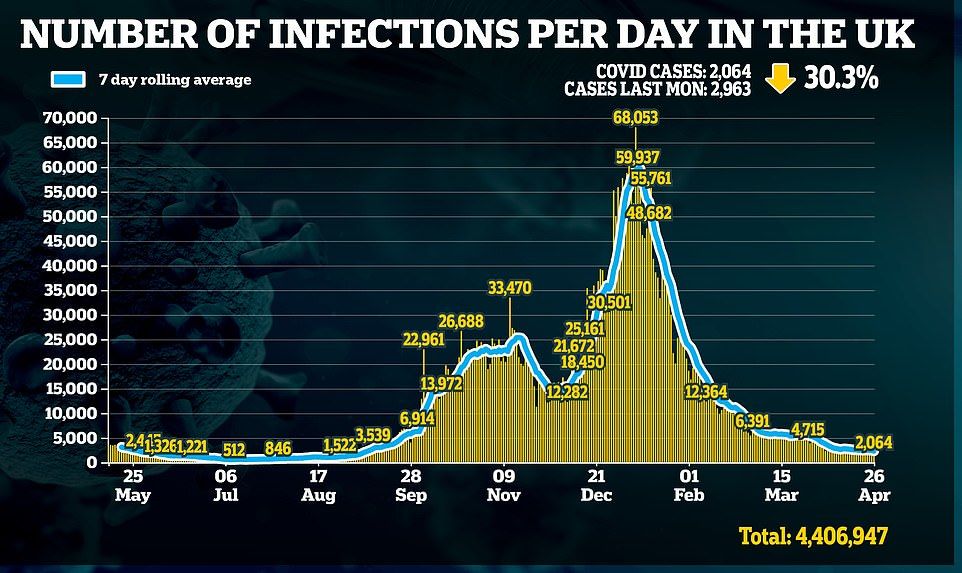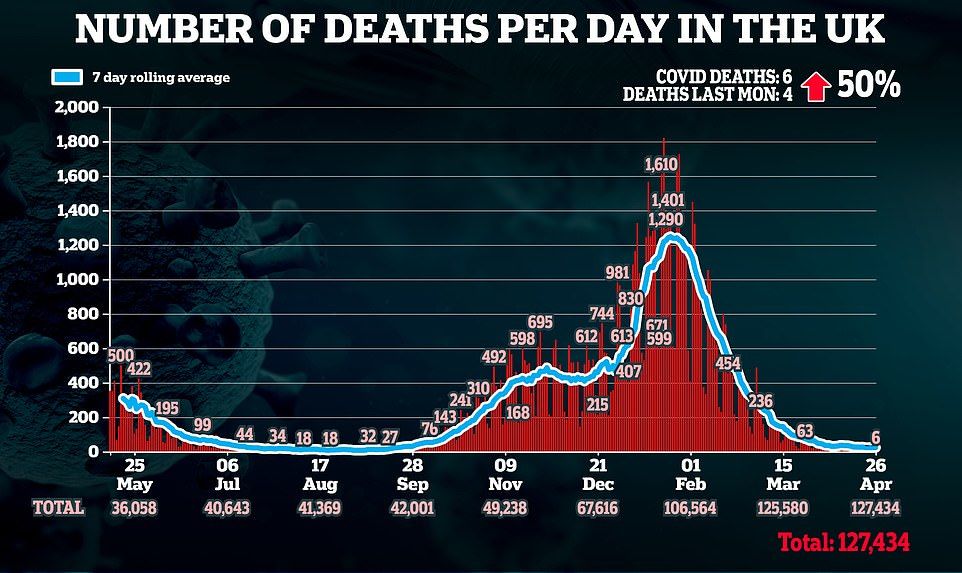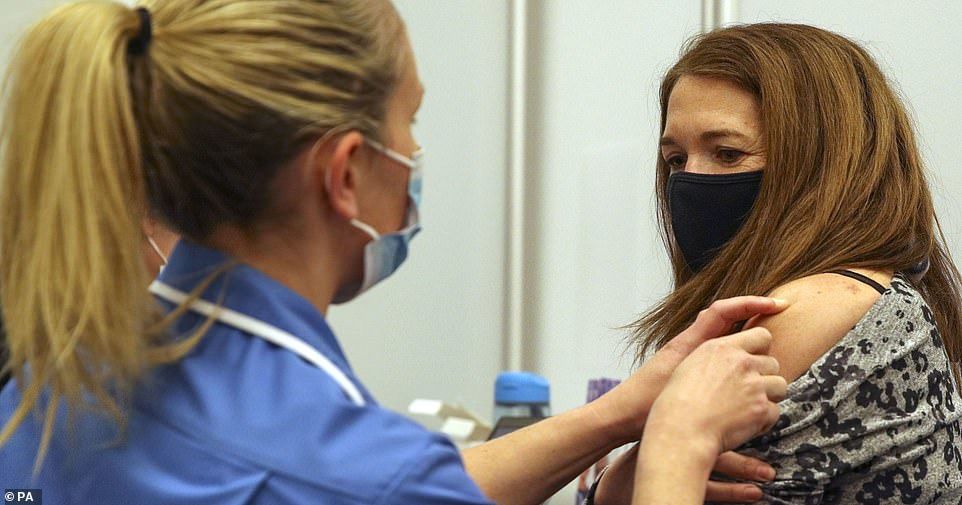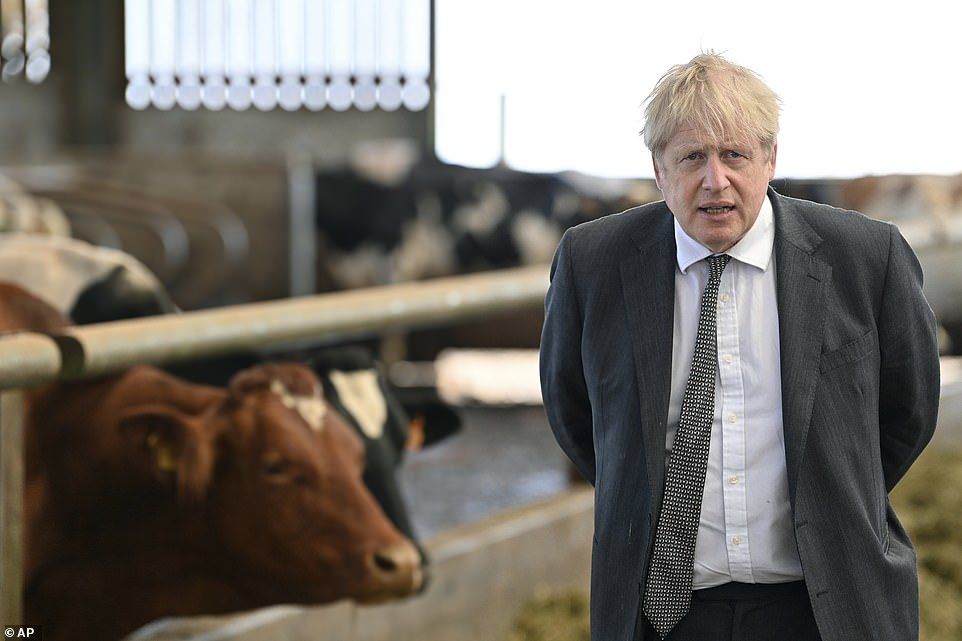England eased lockdown restrictions two weeks ago to allow pubs and restaurants to reopen for outdoor service. Today's figures will add to calls for the next relaxation to be sped up.
Britain today recorded six coronavirus deaths as the daily number of victims remained in single digits for the third time this month, official figures show.
Health chiefs also announced another 2,064 Covid infections in the past 24 hours, which is down by almost a third from last Monday's figure of 2,963.
Latest vaccination figures show 12.9million Britons have been fully immunised against the disease, after another 260,801 second doses were administered on Sunday. Around 33.7m have been given at least one injection.
Today's death toll marks the third time in April that Britain has recorded single-digit coronavirus fatalities, which hasn't happened since September before the second wave took off. There were just four Covid victims last Monday, the lowest number since September 7, and seven on April 7, which was a Sunday.
Coronavirus metrics are usually low on Sundays and Mondays due to the way test results and fatalities are logged, but ministers will take confidence in the fact the average number of daily deaths is trending closer to single digits - it currently stands at 23, down from a peak of almost 1,200 in January.
It also signals England's lockdown easing measures earlier this month have not caused a spike in infections. Outdoor pubs, shops, gyms and hairdressers were allowed to reopen on April 12. The figures will fuel calls for Boris Johnson to speed up his ultra-cautious roadmap for relaxing restrictions, which currently will not see people able to dine indoors or go abroad until May 17.
It comes as scientists urged younger Britons to get their Covid vaccines when they are offered to ensure the UK never has to declare another lockdown, amid reports the drive could start offering the jabs to over-30s in weeks.
The Prime Minister also ruled out an inquiry into the pandemic 'for months', telling bereaved families the Government is too busy dealing with the outbreak to divert resources to the probe.
And the European Union announced it was suing AstraZeneca for an alleged breach in the terms of its contract, which it claims left the bloc trailing behind the US and UK in its rollout.
 Britain's Covid cases fell by almost a third
compared today compared to last Monday after 2,064 were recorded.
England eased restrictions two weeks ago to allow pubs and restaurants
to again serve customers outdoors
Britain's Covid cases fell by almost a third
compared today compared to last Monday after 2,064 were recorded.
England eased restrictions two weeks ago to allow pubs and restaurants
to again serve customers outdoors
 Covid deaths remained in single digits for the
third day this month after another six were recorded. Although this was
up on the same time last week, it was far below the darkest days of
January when there were almost 1,000 fatalities a day
Covid deaths remained in single digits for the
third day this month after another six were recorded. Although this was
up on the same time last week, it was far below the darkest days of
January when there were almost 1,000 fatalities a day
 Everyone over the age of 44 in England can now
get a coronavirus vaccine by booking online or by phone
Everyone over the age of 44 in England can now
get a coronavirus vaccine by booking online or by phone In another day of coronavirus news:
* Britain and the US send aid to India as the country battles against a second wave of the pandemic that has left hospitals swamped with patients;
* European Union chiefs say they will sue AstraZeneca for an alleged 'breach of contract' over jabs rollout;
* Pfizer says its anti-Covid pill may be ready to hit the shelves this year with trials set to end in May;
* As Israel announces it is investigating the Belgium-made jab after 62 cases of heart inflammation were reported out of five million doses dished out;
* And in the UK: Roofer, 50, is rushed to hospital with life-threatening blood clots two weeks after AstraZeneca Covid vaccination;
* Birmingham scientists suggest the virus can spread through the bloodstream from infected gums.
Department of Health data shows today's deaths were up by half compared to the same time last week when four were recorded, but they remained in single digits.
As many as 205 out of 380 local authorities in the UK - more than half - also had an infection rate below 20 cases per 100,000 people on April 21, the latest date available.
Three councils - the Shetland Islands and Comhairle nan Eilean Siar in Scotland and Maldon in Essex - had no cases of the virus over the past seven days.
Derry city, in Northern Ireland, had the highest Covid infection rate in the UK at 109.1 per 100,000. It was followed by Selby, in North Yorkshire, at 80, and Clackmannanshire, also in Scotland, at 69.8.
It comes after doctors today called for young people to make sure they get their Covid jab when they are called by the NHS even if they are at low risk of dying.
Cambridge University epidemiologist Dr Raghib Ali told MailOnline younger people might not see as big a personal benefit to vaccination as older generations.
But widespread vaccination across all adult age groups is vital to bringing an end to the constant restrictions that have ruled people's lives for the past year.
The NHS vaccination programme opened up to people in their late 40s today, with everyone over 44 now eligible for a jab which they can book online or by phone, and it is expected to widen even further to people in their 30s next week.
Experts are concerned that younger people will have lower jab uptake than elderly groups because they don't face a high risk of death from Covid, and they may be more likely to have seen anti-vaxx theories online or be worried about side effects.
Dr Ali said: 'We are going to face an issue, particularly in young people who perceive the threat of Covid to be less.
'I'd say to these people, if you want to avoid another lockdown then vaccination is the best way to do it. Young people suffer from lockdowns most, with their mental and economic health. Vaccination is the only way to do it.'
The Government will launch a new primetime TV advert tonight to urge people of all ages to get vaccinated, showing it in the ad-break on ITV's Emmerdale at 7.15pm.
Another 641,000 vaccine doses were given out yesterday – 498,000 of them were second doses – and Britain has now given 33.67million adults at least one dose of a vaccine, with 12.6million fully protected with both.
'There's a degree of altruism versus personal benefit as you go down the age groups, particularly as you get below 30,' Dr Ali said.
He added: 'The surveys I've seen suggest uptake is going to be about 85 per cent, which isn't as high as the current rate but no-one thought we'd get 95 per cent uptake before.'
Dr Ali suggests a tricky element of young people getting vaccinated is that for many of them it is selfless and intended to protect other people rather than themselves.
NHS data show that only 644 out of the 86,868 people in England to have died of Covid so far have been under the age of 40 – just 0.7 per cent.
 Boris Johnson (pictured today on a visit to
Moreton farm in Wrexham, Wales) has told bereaved families and enquiry
into the Covid pandemic cannot happen 'for months' because the
Government is 'too busy' fighting the pandemic
Boris Johnson (pictured today on a visit to
Moreton farm in Wrexham, Wales) has told bereaved families and enquiry
into the Covid pandemic cannot happen 'for months' because the
Government is 'too busy' fighting the pandemic
Most people admitted to hospital with the disease are in middle age now that vaccines are protecting large proportions of elderly people.
But although younger adults have a low risk of death, the virus spreads fastest among them and in higher numbers, meaning they keep outbreaks going and fuel new ones.
Public Health England data last week showed that people in their 30s had the highest infection rate among adults at 34 positive cases per 100,000 people.
This was followed by 20 to 29-year-olds, with 32 per 100,000. Teenagers had the highest positive test rate (42) but they are not yet able to get vaccines so younger adults must get jabs to reduce the impact of those outbreaks.
Mr Johnson has also ruled out a Covid public enquiry 'for months' telling bereaved families they are too busy dealing with the outbreak to launch an immediate probe into the handling of the crisis.
In a letter to lawyers representing families who have lost loved ones during the pandemic, the Government appeared to rule out starting an official probe for months.
It said 'an inquiry now is not appropriate' because 'the very people who would need to give evidence to an inquiry are working round the clock'.
It said that 'it is not anticipated that the Government's workload will ease in the coming months'.
The comments come amid growing calls for an immediate statutory inquiry into the Government's handling of the crisis.
Boris Johnson has previously committed to holding a probe but he is yet to set out a timetable for doing so.
The letter, seen by The Guardian, was sent to lawyers representing the Covid-19 Bereaved Families for Justice group. The letter, sent on April 1, relates to potential legal action to force an inquiry to begin.
Jo Goodman, co-founder of the group, said the Government's stance was 'an insult to the bereaved [and] prevents the government from protecting future lives to the best of their ability'.
It comes just days after the Archbishop of Canterbury, Justin Welby, piled the pressure on Mr Johnson to launch an inquiry as he said the time for an independent probe 'must be coming close'.
Mr Welby said during a visit to the National Covid Memorial Wall in central London that a probe should focus on 'lessons to be learned' and must be 'very independent' and 'very wide-ranging'.
A Government spokesman told The Guardian that an inquiry will be held 'at the appropriate time' but officials are currently 'rightly focused on protecting public health and saving lives'.
Mr Johnson said in March this year that the Government will launch a public inquiry into the crisis 'as soon as it is right to do so'.
He said the probe will take place 'as soon as it would not be an irresponsible diversion of the energies of the key officials involved'.















